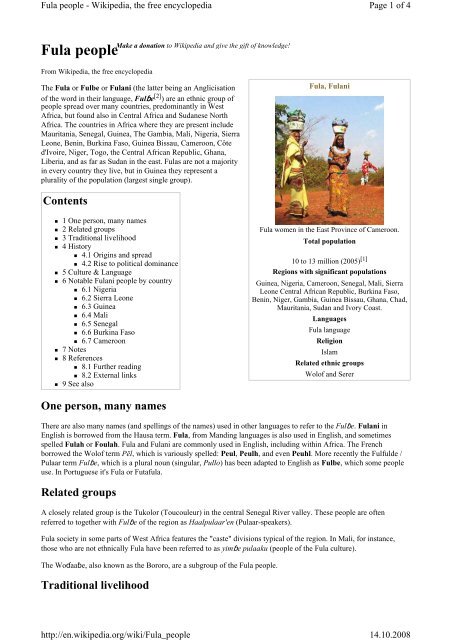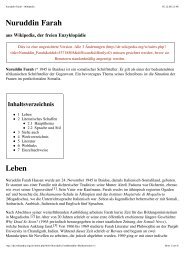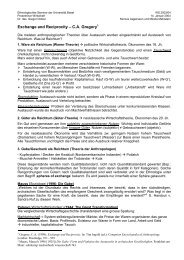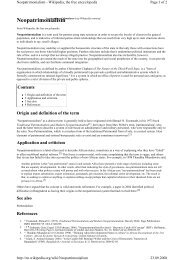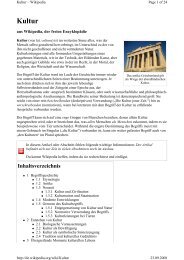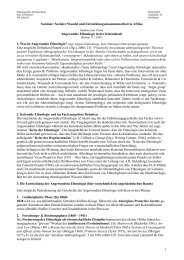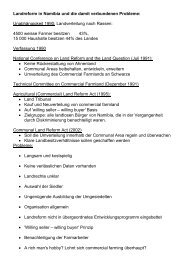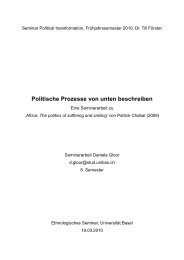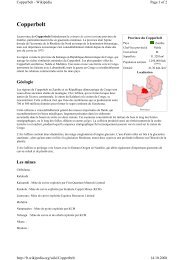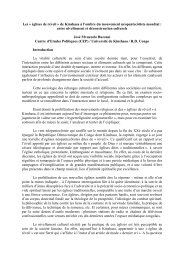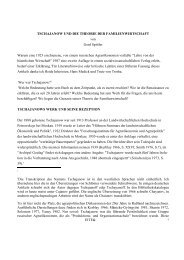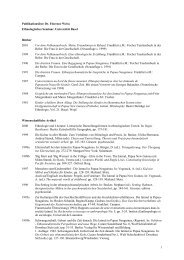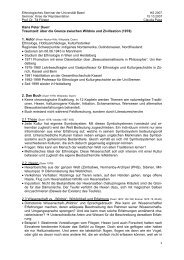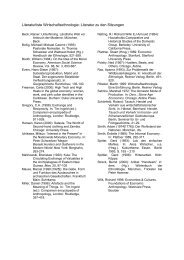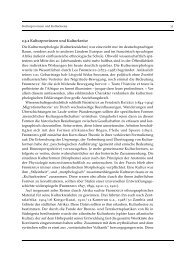Create successful ePaper yourself
Turn your PDF publications into a flip-book with our unique Google optimized e-Paper software.
<strong>Fula</strong> <strong>people</strong> - Wikipedia, the free encyclopedia<br />
<strong>Fula</strong> <strong>people</strong><br />
From Wikipedia, the free encyclopedia<br />
The <strong>Fula</strong> or Fulbe or <strong>Fula</strong>ni (the latter being an Anglicisation<br />
of the word in their language, Fulɓe [2] ) are an ethnic group of<br />
<strong>people</strong> spread over many countries, predominantly in West<br />
Africa, but found also in Central Africa and Sudanese North<br />
Africa. The countries in Africa where they are present include<br />
Mauritania, Senegal, Guinea, The Gambia, Mali, Nigeria, Sierra<br />
Leone, Benin, Burkina Faso, Guinea Bissau, Cameroon, Côte<br />
d'Ivoire, Niger, Togo, the Central African Republic, Ghana,<br />
Liberia, and as far as Sudan in the east. <strong>Fula</strong>s are not a majority<br />
in every country they live, but in Guinea they represent a<br />
plurality of the population (largest single group).<br />
Contents<br />
1 One person, many names<br />
2 Related groups<br />
3 Traditional livelihood<br />
4 History<br />
4.1 Origins and spread<br />
4.2 Rise to political dominance<br />
5 Culture & Language<br />
6 Notable <strong>Fula</strong>ni <strong>people</strong> by country<br />
6.1 Nigeria<br />
6.2 Sierra Leone<br />
6.3 Guinea<br />
6.4 Mali<br />
6.5 Senegal<br />
6.6 Burkina Faso<br />
6.7 Cameroon<br />
7 Notes<br />
8 References<br />
8.1 Further reading<br />
8.2 External links<br />
9 See also<br />
One person, many names<br />
There are also many names (and spellings of the names) used in other languages to refer to the Fulɓe. <strong>Fula</strong>ni in<br />
English is borrowed from the Hausa term. <strong>Fula</strong>, from Manding languages is also used in English, and sometimes<br />
spelled <strong>Fula</strong>h or Foulah. <strong>Fula</strong> and <strong>Fula</strong>ni are commonly used in English, including within Africa. The French<br />
borrowed the Wolof term Pël, which is variously spelled: Peul, Peulh, and even Peuhl. More recently the Fulfulde /<br />
Pulaar term Fulɓe, which is a plural noun (singular, Pullo) has been adapted to English as Fulbe, which some <strong>people</strong><br />
use. In Portuguese it's <strong>Fula</strong> or Futafula.<br />
Related groups<br />
A closely related group is the Tukolor (Toucouleur) in the central Senegal River valley. These <strong>people</strong> are often<br />
referred to together with Fulɓe of the region as Haalpulaar'en (Pulaar-speakers).<br />
<strong>Fula</strong> society in some parts of West Africa features the "caste" divisions typical of the region. In Mali, for instance,<br />
those who are not ethnically <strong>Fula</strong> have been referred to as yimɓe pulaaku (<strong>people</strong> of the <strong>Fula</strong> culture).<br />
The Woɗaaɓe, also known as the Bororo, are a subgroup of the <strong>Fula</strong> <strong>people</strong>.<br />
Traditional livelihood<br />
http://en.wikipedia.org/wiki/<strong>Fula</strong>_<strong>people</strong><br />
Make a donation to Wikipedia and give the gift of knowledge!<br />
<strong>Fula</strong>, <strong>Fula</strong>ni<br />
<strong>Fula</strong> women in the East Province of Cameroon.<br />
Total population<br />
Page 1 of 4<br />
10 to 13 million (2005) [1]<br />
Regions with significant populations<br />
Guinea, Nigeria, Cameroon, Senegal, Mali, Sierra<br />
Leone Central African Republic, Burkina Faso,<br />
Benin, Niger, Gambia, Guinea Bissau, Ghana, Chad,<br />
Mauritania, Sudan and Ivory Coast.<br />
Languages<br />
<strong>Fula</strong> language<br />
Religion<br />
Islam<br />
Related ethnic groups<br />
Wolof and Serer<br />
14.10.2008
<strong>Fula</strong> <strong>people</strong> - Wikipedia, the free encyclopedia<br />
The <strong>Fula</strong>ni are traditionally a nomadic, pastoralist, trading <strong>people</strong>, herding cattle, goats and sheep across the vast dry<br />
hinterlands of their domain, keeping somewhat separate from the local agricultural populations.<br />
History<br />
Origins and spread<br />
While some have speculated over the origin of <strong>Fula</strong>ni <strong>people</strong>, current linguistic and<br />
genetic evidence seems to suggest an indigenous West African origin among the Peul.<br />
[3] The vast majority of genetic lineages associated with them reflect those most<br />
commonly seen in other west Africans. Their language is also of west African origin,<br />
most closely related to that of the Wolof and Serer ethnic groups.[1]. Historical and<br />
archaeological records indicate that Peul-speakers have resided in western Africa since<br />
at least the 5th century A.D. as well. Interestingly, rock paintings in the Tassili-n-Ajjer<br />
suggests the presence of proto-<strong>Fula</strong>ni cultural traits in the region by at least the fourth<br />
millennium B.C. Scholars specializing in <strong>Fula</strong>ni culture believe that some of the<br />
imagery depicts rituals that are still practiced by contemporary <strong>Fula</strong>ni <strong>people</strong>. [4]<br />
Rise to political dominance<br />
Beginning as early as the 17th and 18th centuries, but mainly in the 19th century, <strong>Fula</strong>s and others took control of<br />
various states in West Africa.<br />
These included the <strong>Fula</strong>ni Empire founded by Usman dan Fodio (which itself included smaller states), Fouta Djallon,<br />
Massina and others.<br />
Culture & Language<br />
The language of <strong>Fula</strong>s is called Pulaar or Fulfulde depending on the region, or<br />
variants thereof. It is also the language of the Tukulor. All Senegalese who speak the<br />
language natively are known as the Halpulaar or Haalpulaar'en, which stands for<br />
"speakers of Pulaar" ("hal" is the root of the Pulaar verb haalugol, meaning "to<br />
speak"). In some areas, e.g. in northern Cameroon, Fulfulde is a local lingua franca.<br />
With the exception of Guinea, <strong>Fula</strong>s are minorities in every country they live in (most<br />
countries of West Africa). So some also speak other languages, for example:<br />
Portuguese and Kriol in Guinea-Bissau<br />
French and Arabic in Mauritania<br />
Hausa and French in Niger<br />
French and English in Cameroon<br />
Wolof and French in Senegal<br />
Sango and French in Central African Republic<br />
Bambara and French in Mali<br />
English, Hausa and Ghanaian languages in Ghana<br />
English and some indigenous languages in Sierra Leone, particularly Krio, that lingua franca.<br />
Hausa, other Nigerian languages and English in Nigeria<br />
Page 2 of 4<br />
<strong>Fula</strong>h Girl circa 1914<br />
Popular illustration of <strong>Fula</strong><br />
greeting ritual ca. 1910, in<br />
French it reads: Salutations<br />
among primitive <strong>people</strong>.<br />
The traditional dress of the <strong>Fula</strong> in most places consists of long colorful flowing robes, modestly embroidered or<br />
otherwise decorated. Also characteristic <strong>Fula</strong> tradition is that of women using Henna around the mouth, resulting in a<br />
blackening around the lips. <strong>Fula</strong> ethics are strictly governed by the notion of pulaaku. [5]<br />
<strong>Fula</strong> are primarily known to be pastoralists, but are also traders in some areas. Most <strong>Fula</strong> in the countryside spend long<br />
times alone on foot, moving their herds; they were the only major migrating <strong>people</strong> of West Africa, though most <strong>Fula</strong><br />
now live in towns or villages.<br />
The <strong>Fula</strong> have a rich musical culture and play a variety of traditional instruments including drums, hoddu (a plucked<br />
skin-covered lute similar to a banjo) and riti or riiti (a one-string bowed instrument similar to a violin), in addition to<br />
vocal music. The well known Senegalese <strong>Fula</strong> popular musician Baaba Maal sings in Pulaar on his recordings.<br />
http://en.wikipedia.org/wiki/<strong>Fula</strong>_<strong>people</strong><br />
14.10.2008
<strong>Fula</strong> <strong>people</strong> - Wikipedia, the free encyclopedia<br />
Notable <strong>Fula</strong>ni <strong>people</strong> by country<br />
Nigeria<br />
Umaru Yar'Adua, current President of Nigeria.<br />
Shehu Shagari, Former Nigeria President<br />
Muhammadu Buhari, former Nigerian Head of State<br />
Atiku Abubakar, former Vice President of Nigeria<br />
Shehu Musa Yar'Adua, Nigerian politician and the brother of current Nigerian president Umaru Yar'Adua<br />
Nuhu Ribadu, respected, former Head of Nigerian Anti-corruption agency<br />
Prof Jibril Aminu, Former minister of Education and Petroluem and a Senator in the Nigerian Parliament<br />
Sir Abubakar Tafawa Balewa, Nigerian founding father and first prime minister<br />
Sierra Leone<br />
Amadu Wurie, early Sierra Leonean educationist and politician<br />
Amadu Jalloh, Sierra Leonean politician<br />
Alimamy Rassin, Sierra Leonean chief during colonial period<br />
Minkailu Bah, Sierra Leone's minister of Education, Youth and Sports<br />
Sulaiman Tejan-Jalloh, Sierra Leone ambassador to the United Kingdom<br />
Abubakarr Jalloh, Sierra Leone Minister of Mineral Resources<br />
Alimamy Jalloh, Sierra Leonean football star<br />
Mahmadu Alphajor Bah, Sierra Leonean football star<br />
Rashid Wurie, former Sierra Leonean international football star<br />
Guinea<br />
Mali<br />
Buubakar dit Bocar Biro The Last Almaami of Fuuta Jallon<br />
Cheikh Ibrahima Sambegou(Karamoko Alpha mo Timbo]First Almamy of state of Futa Dialon<br />
Almamy SorySecond Almamy of Futa Dialonafter Karamoko Alpha<br />
Cellou Dalein Diallo, Prime Minister of Guinea from 2004-2007<br />
Saifoulaye Diallo, former Guinean foreign minister<br />
Bobo Balde, Guinean football star<br />
Katoucha, former haute couture model and anti-female circumcision activist<br />
Abdoul Salam Sow, former Guinean footballer<br />
Abdallah Bah, Guinean football star<br />
Diallo Telli (or Boubacar Telli Diallo), Former Diplomat, First Sec. Gen. of the OAU<br />
Ibrahima Diallo, Guinean football star<br />
Alpha Yaya Diallo, Guinean musician<br />
Alpha Yaya Diallo, Former Chef of Labé, arrested by french colonialist<br />
Almamy Schuman Bah, Guinean football star<br />
Ibrahima Barry, Co-creator of the Fulfulde Script<br />
Amadou Diallo, young Guinean resident in the Bronx killed by police in 1999<br />
Adame Ba Konaré, Malian historian and spouse of Alpha Oumar Konaré<br />
Amadou Hampâté Bâ, Malian author<br />
Amadou Toumani Touré, Malian President<br />
Senegal<br />
Baaba Maal, Senegalese singer<br />
Cheikh Hamidou Kane, Senegalese writer<br />
Ibrahim Ba, French-Senegalese former football player<br />
Mamadou Niang Senegales football player<br />
Issa Bâ Senegalese football player<br />
Maba Diakhou Ba Almamy of Rip<br />
Malick Sy marabout<br />
Moussa Ba Senegalese professional kickboxer<br />
Ahmadou Bamba Ba, Marabout, Spiritual Leader<br />
http://en.wikipedia.org/wiki/<strong>Fula</strong>_<strong>people</strong><br />
Page 3 of 4<br />
14.10.2008
<strong>Fula</strong> <strong>people</strong> - Wikipedia, the free encyclopedia<br />
Akon also known as Alioune Badara Thiam is a Senegalese-American Hip-Hop Artist<br />
Burkina Faso<br />
Thomas Sankara, Former President of Burkina Faso<br />
Youssouf Sambo Bâ, Burkinabe politician<br />
Bénéwendé Stanislas Sankara, Burkinabe politician<br />
Cameroon<br />
Ahmadou Ahidjo, first President of Cameroon<br />
Issa Hayatou, current President African Football Confederation (CAF)<br />
Notes<br />
1. ^ Ndukwe 16 (1996) gives a figure of 10 million; Gordon, "Adamawa Fulfulde", says 13 million speakers of all<br />
forms of Fulfulde.<br />
2. ^ The letter "ɓ" is an implosive b sound. In the orthography for languages of Guinea (pre-1985), it was written<br />
bh, so one would have written Fulbhe instead of Fulɓe. Some <strong>people</strong> still use this spelling convention.<br />
3. ^ mtDNA of <strong>Fula</strong>ni Nomads and Their Genetic Relationships to Neighboring Sedentary Populations<br />
4. ^ The <strong>Fula</strong>ni/Fulbe People | Thematic Essay | Timeline of Art History | The Metropolitan Museum of Art<br />
5. ^ Pulaaku Ethics<br />
References<br />
Almanach de Bruxelles (now a paying site)<br />
Gordon, Raymond G., Jr. (ed.) (2005): "Adamawa Fulfulde". Ethnologue: Languages of the World, 15th ed.<br />
Dallas: SIL International. Accessed 25 June 2006.<br />
Ndukwe, Pat I., Ph.D. (1996). <strong>Fula</strong>ni. New York: The Rosen Publishing Group, Inc.<br />
Further reading<br />
Prof. Mark D. DeLancey's Fulbe studies bibiography, Accessed 25 March 2008.<br />
External links<br />
WorldStatesmen - Nigerian Traditional states<br />
See also<br />
Wodaabe<br />
Hausa <strong>people</strong><br />
Mandé <strong>people</strong><br />
Wolof <strong>people</strong><br />
Songhai <strong>people</strong><br />
Page 4 of 4<br />
Retrieved from "http://en.wikipedia.org/wiki/<strong>Fula</strong>_<strong>people</strong>"<br />
Categories: <strong>Fula</strong> • French West Africa • African <strong>people</strong> • Ethnic groups in Sierra Leone • Muslim communities<br />
Hidden categories: "Related ethnic groups" needing confirmation • All articles with unsourced statements • Articles<br />
with unsourced statements since October 2007 • Articles lacking in-text citations<br />
This page was last modified on 27 September 2008, at 22:01.<br />
All text is available under the terms of the GNU Free Documentation License. (See Copyrights for details.)<br />
Wikipedia® is a registered trademark of the Wikimedia Foundation, Inc., a U.S. registered 501(c)(3) taxdeductible<br />
nonprofit charity.<br />
http://en.wikipedia.org/wiki/<strong>Fula</strong>_<strong>people</strong><br />
14.10.2008


